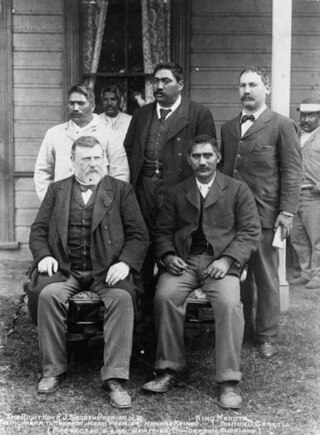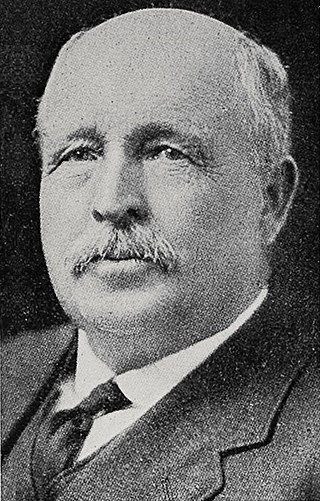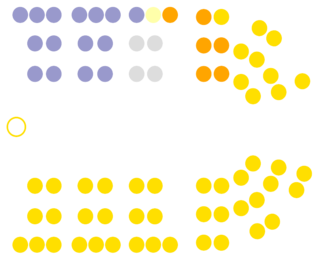
The 1893 New Zealand general election was held on 28 November and 20 December in the European and Māori electorates, respectively, to elect 74 MPs to the 12th session of the New Zealand Parliament. The election was won by the Liberal Party, and Richard Seddon became Prime Minister.

The 1911 New Zealand general election was held on Thursday, 7 and 14 December in the general electorates, and on Tuesday, 19 December in the Māori electorates to elect a total of 80 MPs to the 18th session of the New Zealand Parliament. A total number of 590,042 (83.5%) voters turned out to vote. In two seats there was only one candidate.

Henare Kaihau was a New Zealand Māori politician, serving as Member of the House of Representatives for the Western Maori electorate.

John Andrew MacPherson was a New Zealand politician of the Liberal Party and the United Party.
Waitemata was a New Zealand parliamentary electorate, from 1871 to 1946, and then from 1954 to 1978. It was represented by 18 members of parliament.
Avon is a former New Zealand parliamentary electorate. It was created for the 1861 general election and existed until 1996. It was represented by 13 Members of Parliament and was held by Independents, Liberal Party or Labour Party representatives.
Lyttelton is a former New Zealand parliamentary electorate. It existed from 1853 to 1890, and again from 1893 to 1996, when it was replaced by the Banks Peninsula electorate.
Peninsula was an Otago electorate in the New Zealand Parliament from 1881 to 1893, based on the Otago Peninsula.
Tuapeka is a former parliamentary electorate in the Otago region of New Zealand, from 1871 to 1911.
Hokitika is a former parliamentary electorate in the West Coast region of New Zealand, based on the town of Hokitika. It existed from 1871 to 1890 and was represented by nine members of parliament. For a time, it was one of the two-member electorates in New Zealand.
Bruce was a rural parliamentary electorate in the Otago region of New Zealand, from 1861 to 1922. For part of the 1860s with the influx to Otago of gold-miners it was a multi-member constituency with two members.
Charles Champion Rawlins was a 19th-century Conservative Member of Parliament in New Zealand for just over a year.

John Edie was a Liberal Party Member of Parliament in the Otago region of New Zealand. He was a surveyor and an engineer, and also spent time as a farmer. He was Mayor of Lawrence.
Mackay John Scobie Mackenzie, known as Scobie, was an independent conservative Member of Parliament in New Zealand.
The 5th New Zealand Parliament was a term of the New Zealand Parliament. Elections for this term were held in 68 European electorates between 14 January and 23 February 1871. Elections in the four Māori electorates were held on 1 and 15 January 1871. A total of 78 MPs were elected. Parliament was prorogued in December 1875. During the term of this Parliament, six Ministries were in power.

The 12th New Zealand Parliament was a term of the New Zealand Parliament. It was elected at the 1893 general election in November and December of that year.
The Tuapeka by-election was a by-election in the New Zealand electorate of Tuapeka, a rural seat at the bottom of the South Island.
Joseph Barnes Borton was a New Zealand goldfields warden and cricketer. Along with William Gilbert Rees, Gibson Turton, James Fulton, and John Kissling, he is credited with reviving interest in cricket in Otago in the 1860s.
The 1898 Tuapeka by-election was a by-election held on 2 November 1898 during the 13th New Zealand Parliament in the rural lower South Island electorate of Tuapeka.
This page is based on this
Wikipedia article Text is available under the
CC BY-SA 4.0 license; additional terms may apply.
Images, videos and audio are available under their respective licenses.





